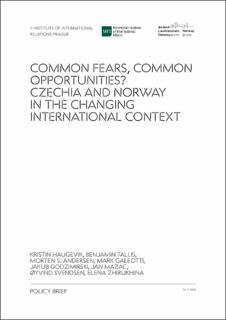| dc.contributor.author | Haugevik, Kristin M. | |
| dc.contributor.author | Tallis, Benjamin | |
| dc.contributor.author | Andersen, Morten Skumsrud | |
| dc.contributor.author | Galeotti, Mark | |
| dc.contributor.author | Godzimirski, Jakub M. | |
| dc.contributor.author | Mazac, Jan | |
| dc.contributor.author | Svendsen, Øyvind | |
| dc.contributor.author | Zhirukina, Elena | |
| dc.date.accessioned | 2020-04-21T12:47:46Z | |
| dc.date.available | 2020-04-21T12:47:46Z | |
| dc.date.created | 2020-04-14T14:34:20Z | |
| dc.date.issued | 2020 | |
| dc.identifier.uri | https://hdl.handle.net/11250/2651919 | |
| dc.description | The policy brief is a result of conclusions from roundtable discussions with policy makers and researchers that took place in Prague and Oslo in late 2019 and early 2020. The researchers studied how to better respond to fear factors and move beyond them in foreign policy. A key observation made in the new brief is that while changes in American, Chinese and Russian foreign policies may trigger anxiety and uncertainty among smaller European states, fears like this can also have productive effects on foreign policy thinking and practice. For states like Czechia and Norway, it can create opportunities for re-thinking support networks and reaching out to new partners. | en_US |
| dc.description.abstract | With long-dominant structures in flux, European states – and perhaps smaller ones in particular – are now forced to rethink their foreign policy approaches and practices. This policy briefs outlines how one small Northern European state, Norway, and one Central European state, Czechia, assess and respond to a changing international political context. While located in different geopolitical settings, and with different histories, political systems and resources at their disposal, Norway and Czechia operate under many of the same international framework conditions. How are Norwegian and Czech officials and policy makers evaluating contemporary developments? What do they identify as the key fears to which they must respond? Which partners and institutional structures have they traditionally relied on – and what indications of change (if any) can we now observe? We find that Norway and Czechia face many common fears – from concerns about the international order and their global sense of place, to challenges to key institutions such as NATO and the EU, and concerning specific issues such as climate change, energy security, territorial security, and how to best respond to migration. We argue that these common fears could provide a springboard to greater cooperation that can diversify Czechia and Norway’s support networks and entrench a greater sense of international belonging for both countries. | en_US |
| dc.language.iso | eng | en_US |
| dc.publisher | Institute of International Relations, Prague, NUPI, Oslo | en_US |
| dc.title | Common Fears, Common Opportunities? Czechia and Norway in the changing international context | en_US |
| dc.type | Research report | en_US |
| dc.description.version | publishedVersion | en_US |
| dc.source.pagenumber | 8 | en_US |
| dc.identifier.cristin | 1806160 | |
| dc.relation.project | EØS - Det europeiske økonomiske samarbeidsområde: EHP-BFNU--OVNKM-2-039-2019 | en_US |
| cristin.ispublished | true | |
| cristin.fulltext | original | |
